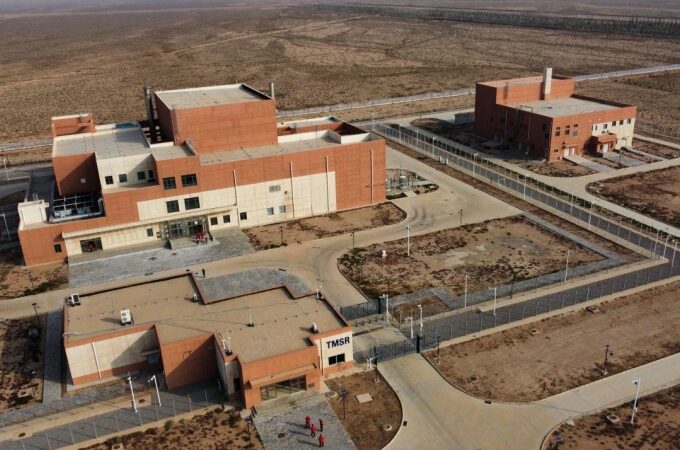On the opening day of the 29th United Nations Climate Change Conference (COP29), US presidential climate envoy John Podesta said at a press conference that US climate action is expected to be put on hold after the re-election of former US President Donald Trump. But he also said efforts to combat climate change at home would continue.
On November 11, local time, COP29 opened in Baku, Azerbaijan, where participants from all over the world once again gathered to find solutions to the crisis of climate change, which is common to all mankind. However, the conference was overshadowed by the outcome of the US presidential election in 2024 – a resounding victory for Mr. Trump, who has called climate change a “hoax” and promised to pull the US out of the Paris Agreement again, and will take office in January.
After first taking office, Trump announced his withdrawal from the Paris Agreement in June 2017. The United States did not rejoin the Paris Agreement until January 2021, when current US President Joe Biden took office. Now Mr Trump is set to return to the White House in January. He is seen as highly likely to pull the US out of the Paris Agreement for a second time. However, many experts said that even if Trump withdrew from the Paris Agreement again, it would not have a significant impact on the future implementation of the Paris Agreement. Since Trump’s first withdrawal from the Paris Agreement, no other country has followed suit. It is expected to be the same this time.

As one of the world’s largest emitters of greenhouse gases, the U.S. government’s climate policies will not only affect climate action in the United States, but also affect climate action around the world. At the same time, after Trump came to power again, the direction of climate cooperation between China and the United States has become a major focus of attention.
History and Current Situation of Sino-US Climate Cooperation
Trump announced his withdrawal from the Paris Agreement in 2017 during his first term in office, claiming that the agreement did not serve the economic interests of the United States. He argued that U.S. participation in the pact would hurt the domestic fossil fuel industry, particularly coal, and oil, while increasing environmental compliance costs for companies. On the campaign trail in 2024, Trump has said he will continue to pursue an “America first” energy policy, suggesting that he may again withdraw from the Paris Agreement. His stance is aimed at supporting the traditional energy industry and cutting environmental regulations in order to achieve short-term economic growth and jobs.
Despite tensions over trade, technology, and geopolitics, climate change has been one of the key areas of cooperation between the two countries. After Biden took office, the United States quickly rejoined the Paris Agreement and tried to resume dialogue and cooperation with China on climate issues.
However, despite the Biden administration’s aggressive approach to climate policy, cooperation between China and the United States has been shaky. The two sides have some differences on new energy investment, carbon market mechanisms, and international climate finance, and geopolitical tensions have also disrupted the climate talks.

As the world’s two largest emitters of greenhouse gases, China and the United States together account for about 38 percent of the world’s greenhouse gas emissions. That is why cooperation between China and the United States is particularly important in addressing the global climate crisis. Climate cooperation between China and the United States has waxed and waned over the past few years before resuming some cooperation last year. However, as Trump is about to take office again, the outside world is worried that Sino-US cooperation in the field of climate may stop again.
With Donald Trump about to return to the White House, the future of China-Us climate cooperation is in doubt. At the state and local level, there is also expected to be some room for cooperation, such as the positive interaction between California and China on climate cooperation during Trump’s first term. This cooperation is not limited to the policy level, but is more likely to extend to technology sharing, especially in areas such as reducing greenhouse gas emissions, introducing renewable energy, and even carbon neutrality.
The Potential Impact of Trump’s Withdrawal on Sino-US Cooperation
Lack of global climate leadership: The United States and China jointly pushed for the conclusion of the Paris Agreement, and their cooperation is seen as the core strength of global climate governance. If the United States were to withdraw again, it would significantly weaken international confidence, leading other countries to likely follow the U.S. lead and review and scale back their own climate commitments. Particularly in the developing world, this could lead to uncertainty about climate finance and technical support.
Growing U.S.-China climate competition: The Trump administration’s climate policies favor the development of fossil fuel industries, in stark contrast to China’s rapid expansion in renewable energy in recent years. The withdrawal of the United States from the Paris Agreement is likely to exacerbate tensions over green technologies, carbon tariffs and environmental standards. The competition between China and the United States will not only affect the development of the global green economy, but also may trigger new disputes in the field of international trade and investment.

Domestic vs. local forces make up for it: While Trump’s withdrawal could pose significant challenges, state and local agencies within the United States are likely to continue pushing for climate action. Several states, led by California, have taken steps to reduce emissions independently of the federal government over the past few years, forming the “We Are Still In” coalition to show they will continue to meet their commitments under the Paris Agreement. In addition, the global market demand for clean energy continues to grow, and companies and financial institutions are increasing their green investments. These forces may, to some extent, make up for the vacancy caused by the withdrawal of the federal government and maintain market cooperation and technological exchanges between China and the United States.
Trump’s re-election could have implications for US-China climate cooperation, especially at the federal level. However, cooperation at the local level, such as California’s climate cooperation with China, may become a new highlight of China-Us climate cooperation. Such cooperation will not only promote climate action, but also provide new ideas and solutions for global climate governance. Despite the challenges, cooperation between China and the United States in the field of climate remains vital and irreplaceable to global efforts to address climate change.












